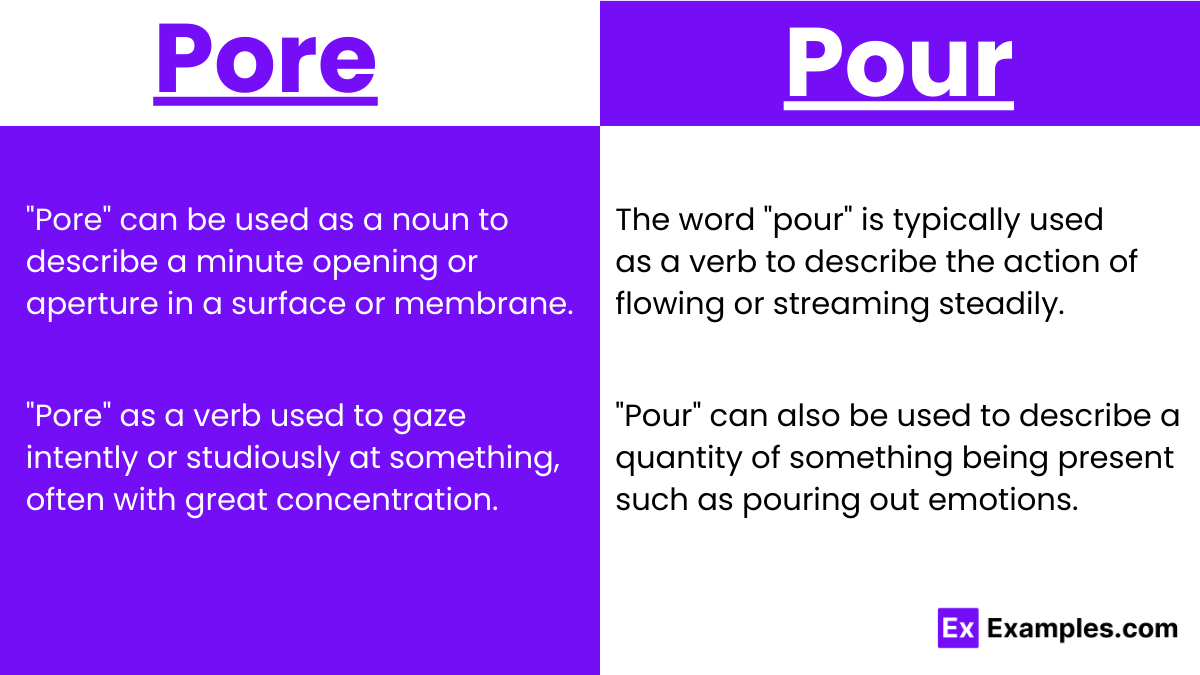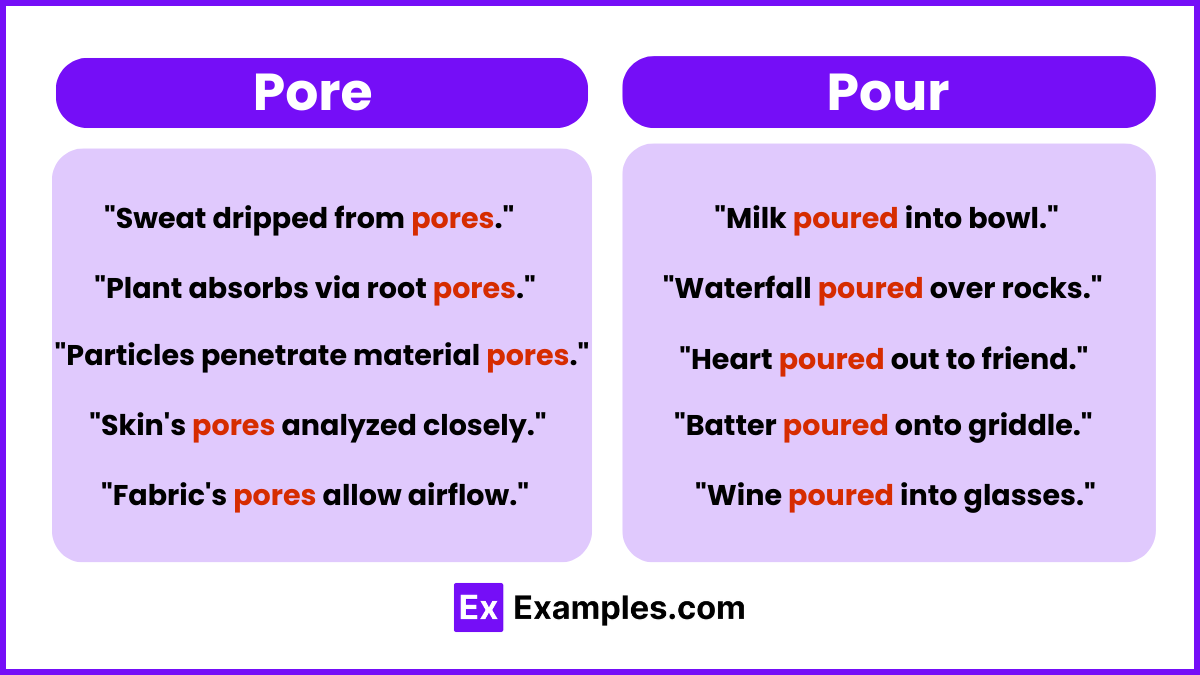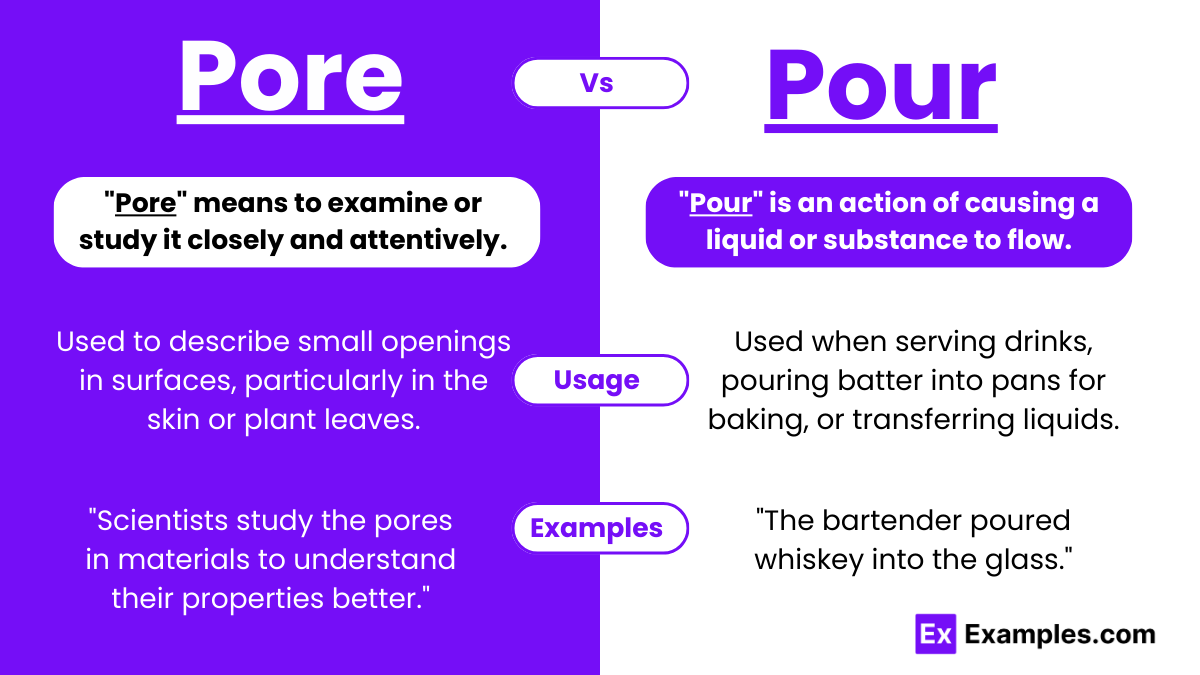Pore vs Pour
In everyday language, “pore” and “pour” sound identical, but they hold completely different meanings. As a verb, “pore” means to gaze intently or reflect steadily, while “pour” refers to the continuous flow or streaming of liquid. Despite their similar sounds, you can’t interchange them. For example, you can pour a drink, but you can’t pore a drink. Similarly, you can cleanse your pores with a face wash, but you can’t cleanse your pours. Understanding when to use “pore” or “pour” can enhance your writing and communication skills.
Pore and Pour – Meanings
- As a noun, “pore” refers to a tiny opening, especially in the surface of a material or membrane, through which substances such as liquids, gases, or microscopic particles may pass. Pores are commonly found in materials like skin, rocks, and membranes. As a verb, To pore over something means to examine or study it closely and attentively.
- “Pour” serves as a verb. Pour is an action of causing a liquid or granular substance to flow in a steady stream from a container. It involves transferring the contents of a container by tilting or emptying it, typically with the intention of distributing the substance over a surface
Summary
“Pore” and “pour” are homophones, meaning they sound the same but have different meanings and uses. “Pore” refers to a tiny opening or hole, often found on surfaces like skin or leaves. As a verb, it means to study or scrutinize something attentively. “Pour” means to flow or transfer a liquid or granular substance in a steady stream, like pouring a drink or rain pouring down.
How to pronounce Pore and Pour
- Pore: Pronounced as /pɔːr/ (rhymes with “more”)
- Pour: Pronounced as /pɔːr/ (rhymes with “door”)
How to Remember the Difference
So, when discussing skincare or scientific matters, use “pore” to refer to tiny openings. Conversely, when describing actions involving liquids, opt for “pour” to denote the act of flowing or streaming and also:
- Pore: Think of the “o” in “pore” as representing something round or an opening, like the pores in your skin.
- Pour: The “ou” in “pour” resembles a spout or something flowing, like pouring a liquid.
Differences between Pore and Pour
| Aspect | Pore | Pour |
|---|---|---|
| Definition | Small opening, usually in surfaces | To cause a liquid or fine substance to flow |
| Nature | Typically stationary or static | Involves movement or action |
| Usage | Often used in contexts of examination, absorption, or concentration | Typically used when talking about liquids being transferred or distributed |
| Application | Can refer to skin, surfaces, or objects | Primarily used in the context of liquids being transferred |
| Physical Action | Implies inspection, scrutiny, or absorption | Involves the act of pouring liquid from one container to another |
| Noun/Verb | Can be both a noun and a verb | Primarily used as a verb |
| Common Contexts | Skin care, scientific analysis, study | Cooking, serving drinks, rainfall |
How to use Pore and Pour

Pore Usage
As a noun:
- Pore (noun): A small opening or hole in a surface, typically in the skin or a plant leaf, through which fluids, gases, or microscopic particles can pass. Example: “The skin has tiny pores that allow sweat to escape.”
As a verb:
- Pore (verb): To gaze intently or studiously at something, often with great concentration or focus. Example: “She pored over the map, trying to find the best route.”
- Pore (verb): To read or study something carefully and attentively. Example: “He spent hours poring over his notes before the exam.”
Pour Usage
Pour (verb):
- To cause a liquid to flow out of a container in a steady stream. Example: “She poured herself a glass of water from the pitcher.”
- To transfer a liquid or granular substance from one container to another. Example: “He poured the milk from the carton into a bowl for his cereal.”
- To rain heavily or continuously. Example: “It’s pouring outside, so don’t forget your umbrella!”
When to use Pore and Pour
Pore
- Skin Care and Biology: Used to describe small openings in surfaces, particularly in the skin or plant leaves, through which fluids, gases, or microscopic particles can pass.
- Texture Description: Refers to materials or substances with a porous surface, allowing for the passage of liquids or gases.
- Concentration or Study: Describes the action of concentrating or studying something intently, often used in the phrase “to pore over.”
Pour
- Liquid Transfer: Refers to the action of causing a liquid or granular substance to flow in a steady stream, typically from one container to another.
- Serving Drinks and Cooking: Used when serving drinks, pouring batter into pans for baking, or transferring liquids during cooking or other tasks.
- Rainfall: Describes heavy rainfall, as in “it’s pouring rain.”
Examples – Pore and Pour

Pore Examples
- Cleanse your face to unclog pores.
- Plant leaves have tiny pores for gas exchange.
- The sponge absorbs water due to its porous texture.
- Scientists study the pores in materials to understand their properties better.
Pour Examples
- She poured pancake batter onto the griddle.
- The bartender poured whiskey into the glass.
- Rain poured down in torrents during the storm.
- He poured himself a cup of coffee.
Synonyms
| Pore (noun/verb) | Pour (verb) |
|---|---|
| Opening | Stream |
| Hole | Flow |
| Aperture | Transfer |
| Studying | Dispense |
| Concentrate | Serve |
Exercise
- He carefully ___ the batter into the cake pan.
- The fabric had tiny ___ that allowed air to pass through.
- She ___ herself a cup of tea before settling down to read.
- Students often ___ over textbooks late into the night before exams.
- The bartender ___ a generous amount of wine into the glass.
Answers
- poured
- pores
- poured
- pore
- poured
FAQ’S
What is the difference between pore and pour?
“Pore” refers to small openings, like in the skin. “Pour” means to flow liquids steadily, like pouring water from a jug.
Is it pouring over or poring over?
It’s “poring over,” meaning to study intently. “Pouring over” is incorrect in this context.
How do you use pour and pore in a sentence?
You “pour” liquid into a glass. Skin has “pores” that allow sweat to escape.
How do you spell pour as in no money?
“Poor” means lacking wealth. “Pour” means to flow liquid. They’re spelled differently but sound the same.
How do you pronounce poor vs pour vs pore?
“Poor” sounds like “paw,” lacking wealth. “Pour” sounds like “pore,” flowing liquid. “Pore” sounds like “pour,” small openings.


